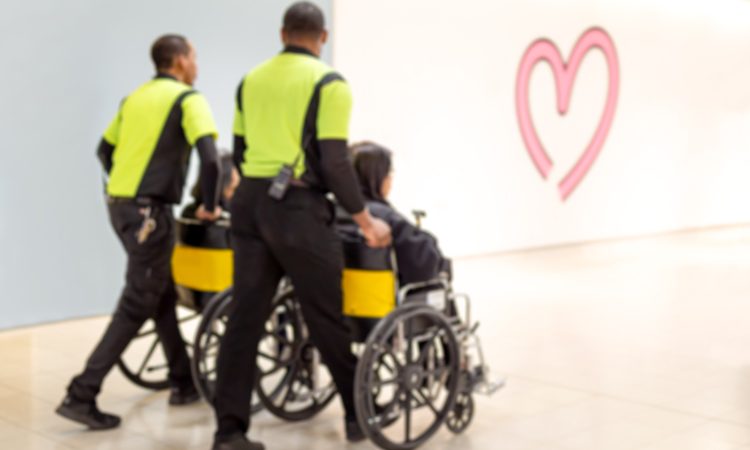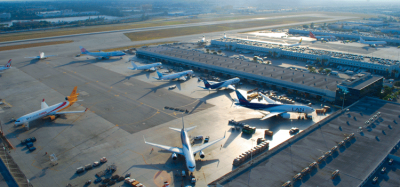Consider the need and potential benefit of cross training your staff
- Like
- Digg
- Del
- Tumblr
- VKontakte
- Buffer
- Love This
- Odnoklassniki
- Meneame
- Blogger
- Amazon
- Yahoo Mail
- Gmail
- AOL
- Newsvine
- HackerNews
- Evernote
- MySpace
- Mail.ru
- Viadeo
- Line
- Comments
- Yummly
- SMS
- Viber
- Telegram
- Subscribe
- Skype
- Facebook Messenger
- Kakao
- LiveJournal
- Yammer
- Edgar
- Fintel
- Mix
- Instapaper
- Copy Link
Posted: 5 August 2019 | Samantha Saunders - OmniServ | No comments yet
Samantha Saunders, Head of Innovation & Regulatory Compliance at OmniServ, offers up her opinion on why we need to consider changing both how airport suppliers train not just staff helping passengers with reduced mobility (PRM), but all other airport teams, in order to drive an attitude change in how assistance is delivered to those who need it.


Airports are busy places, and all staff present require training. Airports are also places where you see high levels of emotions, every day. As someone who has worked in the airport industry for 35 years, I have seen my fair share of emotion, every day. Happy re-unions and sad departures, but also anger and frustration due to delays.
Working with passengers with reduced mobility
For most of us who work at an airport, these snatches of emotionally-charged energy are simply snippets in our everyday life. But for anyone involved in the delivery of passengers with reduced mobility (PRM) assistance services, we have a great opportunity to become part of someone’s life story.
I recently met two customers at Manchester Airport and assisted them through check in. Chatting to them, I discovered that they were off to Melbourne to meet up with seven siblings for a niece’s 50th birthday. I also found out that they planned to marry in 1974, but had an argument a week before the wedding and called it off. They’d only re-connected six years ago.
I felt so privileged to be part of their journey. There are hundreds of members of staff who can end up as a part of someone else’s journey and I think we need to recognise how important their job is.
What is required from staff working with PRMs
PRM support staff can have a massive impact on the lives of the customers they help. They aren’t just interchangeable cogs in a machine: They are on the front-line, day in, day out, and they are likely to spend more one-to-one time with a customer than any check-in agent, cabin crew or other airport or airline employee.
They must deliver services cost-effectively, but also in a way that respects their customers’ dignity and makes them feel like they are being genuinely cared for.
That’s a tough ask. It is vital we help these colleagues and, indeed, our wider workforces, to understand the real significance of their roles and the positive impact they can have on each and every customer they help.
All too often, the only time we even consider them is when something goes wrong. Unfortunately, you don’t often see people taking to Twitter to say what a great experience they’ve had.
More often than not, it’s not usually the PRM team’s fault that something has gone wrong – frequently, it’s because an aircraft is late and ends up at a gate at the other end of the airport from where they’re supposed to be, or a vital piece of equipment isn’t where it should be.
Improving staff training for the future
In the aviation industry, there is also a misconception that the value of a role is based on the pay rate associated with it. Time and again, I hear PRM teams referred to as ‘wheelchair pushers’ – completely ignoring the extensive training they go through, not to mention the kindness and empathy that they show to the people in their care.
I think it’s time we gave them a title that better fits their hugely-important role. Perhaps something like Customer Experience Executives, because, after all, they are the people who create the experience for the PRM passengers (and their families) that they are looking after. They are true brand ambassadors.
Core values and service personality need to be refreshed, focusing on respect, integrity, collaboration, innovation, excellence and trust.
But it’s not enough to train our PRM staff to deliver against these core values: They must infuse the whole organisation.
I also think it would do all our airport teams good to spend some time every year shadowing a PRM team, so they can get a better idea of what is dealt with, and the training they go through.
We tried this out, giving some security staff a taste of what it’s like for the PRM teams – and I think it’s fair to say it’s been a real eye opener for them. The feedback from this cross-training has been brilliant. They found it fun, they found it enlightening, they found it challenging and above all they found it rewarding. “I feel like I’ve made a real difference today,” one member of staff said. “I will fundamentally do my job differently now,” said another.
While not necessarily safe to let untrained staff take full responsibility for PRM passengers, though – believe it or not, our ‘wheelchair pushers’ actually get trained in first aid, safety, how to help passengers who have mobility, sight or other issues, and a whole host of other elements that are key to delivering proper PRM services, I do believe that cross-training other staff members allows us to further enhance the airport experience for our customers.
Related topics
Passenger experience and seamless travel, Passengers with reduced mobility (PRMs), Recruitment and training, Workforce


















